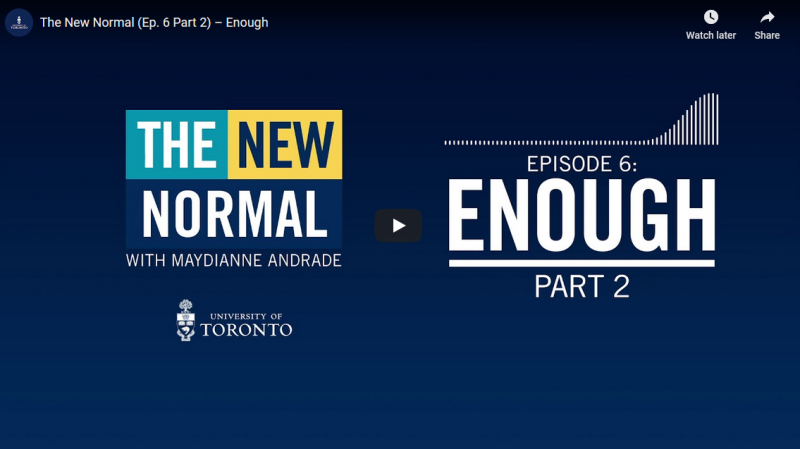June 19, 2020 | Alumni
The New Normal with Maydianne Andrade: two-part episode on anti-Black racism

Listen to Episode 2:
It has been 155 years since the last enslaved Black people in the United States were freed – and just 22 days since George Floyd was killed, setting off protests against anti-Black racism around the world.
“It does feel like we might actually be in an important moment of change,” says the University of Toronto’s Dr. Onye Nnorom (MPH 2011). “And it feels like we are writing history.”
Nnorom, the Black health theme lead for the Faculty of Medicine’s MD program and the equity, diversity and inclusion lead for the department of family and community medicine, is a guest on Professor Maydianne Andrade (MSc 1995)’s weekly podcast, The New Normal. The second instalment of a special two-part episode, titled “Enough,” explores the intergenerational impact and trauma of anti-Black racism and violence through scholarly perspectives and personal experiences.
“A hundred years ago, as a Black woman, my circumstance would be quite different,” says Nnorom. “If we do the right work that we need to do now, then for a little Black girl who is born a hundred years from now, she will not know what I have lived and experienced.
“And when we look back and our grandchildren and everyone asks us what we did, it really is a question of: Were you on the side of justice?
Andrade, a Canada Research Chair in Integrative Behavioural Ecology and the U of T Scarborough’s vice-dean of faculty affairs and equity, is also joined by Julius Haag (MA 2011), an assistant professor, teaching stream, in U of T Mississauga’s department of sociology and an expert in policing, youth justice, racialization and criminalization, recent graduate Dorian Grey (BSc 2019 UTSC), a mentor for Black high school youth and volunteer with the Imani Academic Mentorship program – and by Andrade’s 17-year-old daughter, Lily.
Listen to Episode 1:
Captured on video, the brutal killing of George Floyd has sparked protests against anti-Black racism and police violence around the world.
Will the outrage lead to real change this time?
“I think there are some things that, once you see them, you can't unsee them. That video is one of them,” says Professor Maydianne Andrade (MSc 1995) in “Enough” – the first instalment of a special two-part episode of her weekly podcast, The New Normal.
“This one really is worldwide at a time when everyone is thinking about communal action.”
The episode explores the intergenerational impact and trauma of anti-Black racism and violence through scholarly perspectives and personal experiences. Andrade, who is a Canada Research Chair in Integrative Behavioural Ecology and the University of Toronto Scarborough’s vice-dean of faculty affairs and equity, is joined by Mark Campbell (PhD 2010), an assistant professor at U of T Scarborough’s department of arts, culture and media and an expert in hip hop and the music of Black communities, and Julius Haag (MA 2011), an assistant professor, teaching stream, in U of T Mississauga’s department of sociology and an expert in policing, youth justice, racialization and criminalization.
“There are 40 different cities where people are violating curfew to demonstrate their protests, you know, and honour the life of George Floyd,” Campbell says. “So I'm hoping that this is the moment because I won't see another moment like this in my lifetime.”
To learn more about anti-Black racism:
City of Toronto anti-Black racism community resources
City of Toronto anti-Black racism action plan
Ontario’s anti-racism plan
Broadbent Institute policy proposals to tackle anti-Black racism
Hosted by Andrade, The New Normal is created in collaboration with a University of Toronto Communications team led by producer Lisa Lightbourn. You can listen to the podcast on Spotify or listen on SoundCloud. You can also find it on Apple or listen on Google.
Members of the U of T community who need support are encouraged to contact the Anti-Racism and Cultural Diversity Office and the equity, diversity and inclusion offices at U of T Scarborough and U of T Mississauga.
Feeling distressed? Find someone to talk to right now – and if there is an immediate risk, call 911.
24-7 community supports available in Toronto include:
- Distress Centres of Greater Toronto 416-408-HELP (4357)
- The Centre for Addiction and Mental Health at 250 College Street
- Anishnawbe Health Toronto Mental Health Crisis Line 416-360-0486

